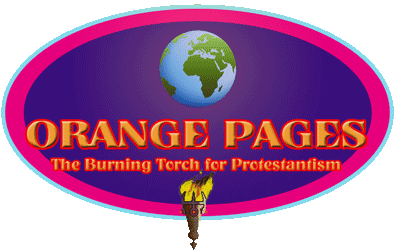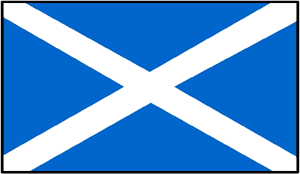|
Knox, John (1505
- 1572), led the
Protestant Reformation in Scotland. His strong personality and fiery preaching
made him one of the most powerful Scots of his day. Under his leadership,
the Church of Scotland adopted a declaration of faith, a form of government,
and a liturgy. The church reflected the presbyterian teachings of the
reformer John Calvin, who greatly influenced Knox.
Early years. Knox was born near Haddington, east of Edinburgh. Little
is known of his early life, except that he probably attended the University
of St. Andrews. He became a Catholic priest in 1536. In those days, Scotland
was one of the poorest, most backward countries of Europe. For many years,
Scottish kings had been weak. Some had been children controlled by regents.
The country was often torn by conflict between nobles. The church owned
much of the nation's wealth, and the kings and nobles controlled the church.
Politically, Scotland was merely one small part of the rivalry between
France and England.
During Knox's early years, a few Scots tried to become Protestant reformers,
though they had little hope for reform in either church or government.
In the early 1540's, Knox became a follower of the Protestant reformer
George Wishart. Early in 1546, Wishart was arrested on the orders of David
Cardinal Beaton, and was burned at the stake on a charge of heresy. In
revenge, a group of Protestants assassinated the cardinal later that year
and seized the castle of St. Andrews, his residence. Knox did not take
part in the assassination, but he joined the Protestants in the castle.
Mary of Guise, the Roman Catholic pro-French regent of Scotland, asked
for assistance from France. The French fleet captured the castle in July
1547, and Knox and several others were taken to France as galley slaves.
Later career. In 1549, the English government obtained the release of
Knox and his associates. The government wanted them to build a pro-English
Protestant party in Scotland. But the pro-French Catholics in Scotland
were too strong, and so Knox went to England as a minister. He preached
in Berwick for two years and became known as a radical Protestant reformer.
In 1553, Mary Tudor became Queen of England and made Roman Catholicism
the state religion again. Knox was one of the Marian Exiles--Protestants
who fled to the European continent as religious refugees. While there,
he met Calvin in Switzerland.
Late in 1554, Knox became pastor of a church of English refugees in Frankfurt,
Germany. He was forced to leave Frankfurt after a conflict with moderate
Protestants. He returned to Geneva with most of the English radicals from
Frankfurt, and founded a new refugee church. In Geneva, Knox corresponded
secretly with Protestants in England, Scotland, and France. He also wrote
pamphlets justifying the rights of persecuted people to rebel against
tyrannical rulers.
Queen Mary died in 1558, and her successor, Queen Elizabeth, again changed
England's state religion. Many Marian Exiles returned, and Knox arrived
in Scotland in 1559. The English government helped him and his associates
rebel against Mary, Queen of Scots, and establish Protestantism as Scotland's
national religion. Mary was a Roman Catholic. Under Knox's leadership,
the Scottish Parliament made Presbyterianism the state religion in 1560.
From 1560 until his death, Knox was Scotland's most powerful political
and religious leader. He was appointed minister of Edinburgh and preached
at St. Giles' Cathedral, which became the political and religious centre
of Scotland. His unfinished History of the Reformation of Religion in
the Realm of Scotland is a dramatic autobiographical account of the Scottish
Reformation to about 1564.

Calvin, John (1509-1564),
was one of the
chief leaders of the Protestant Reformation. Calvin's brilliant mind,
powerful preaching, many books and large correspondence, and capacity
for organization and administration made him a dominant figure of the
Reformation. He was especially influential in Switzerland, England, Scotland,
and colonial North America.
His life. Calvin was born in Noyon, France, near Compiegne. His father
was a lawyer for the Roman Catholic Church. Calvin was educated in Paris,
Orleans, and Bourges. After his father's death in 1531, he studied Greek
and Latin at the University of Paris. Thus, Calvin's education reflected
the influence of the liberal and humanistic Renaissance. Unlike several
other leaders of the Reformation, Calvin was probably never ordained a
priest.
By 1533, Calvin had declared himself a Protestant. In 1534, he settled
in Basel, Switzerland. There, he published the first edition of his Institutes
of the Christian Religion (1536). This book achieved immediate recognition
and, Calvin expanded it throughout his life. The book sets forth Calvin's
basic ideas on religion and is a masterpiece of Reformation literature.
In 1536, Calvin was persuaded to become a leader of the first group of
Protestant pastors in Geneva, Switzerland. In 1538, Geneva leaders reacted
against the strict doctrines of the Protestant pastors, and Calvin and
several other clergymen were banished. Later that year, Calvin became
pastor of a French refugee Protestant church in Strasbourg, Germany, where
he was influenced by the older German Protestant leaders, especially Martin
Bucer. Calvin adapted Bucer's ideas on church government and worship.
Geneva lacked able religious and political leadership. The Geneva city
council begged Calvin to return, and he did so in 1541. From then until
his death, Calvin was the dominant personality in Geneva.
Calvinism. From its beginning in 1517, the Reformation brought religious
and political opposition from the church and from civil rulers. By 1546,
many Protestants in Germany, Switzerland, and France were insisting that
the people--not just kings and bishops--should share in political and
religious policy-making. This idea influenced Calvin and his followers
in France, England, Scotland, and the Netherlands. Calvin's French followers
were called Huguenots. The English Protestants whom he influenced were
called Puritans.
The Calvinists developed political theories that supported constitutional
government, representative government, the right of people to change their
government, and the separation of civil government from church government.
Calvinists of the 1500's intended these ideas to apply only to the aristocracy.
But during the 1600's, more democratic concepts arose, especially in England
and later in colonial America.
Calvin agreed with other early Reformation leaders on such basic religious
theories as the superiority of faith over good works, the Bible as the
basis of all Christian teachings, and the universal priesthood of all
believers. According to the concept of universal priesthood, all believers
were considered priests. The Roman Catholic Church, on the other hand,
had various ranks of priests that were separate from laypersons.
Calvin also declared that people were saved solely by the grace of God,
and that only people called the Elect would be saved. However, nobody
could know who the Elect were. Calvin expanded the idea that Christianity
was intended to reform all of society, and he lectured and wrote on politics,
social problems, and international issues as part of Christian responsibility.
Many of Calvin's ideas were controversial, but no other reformer did so
much to force people to think about Christian social ethics. From this
ethical concern and Bucer's ideas, Calvin developed the pattern of church
government that today is called presbyterian. Calvin organized the church
government separately from civil government, so that an organized body
of church leaders could work for social reform. He was the first Protestant
leader in Europe to gain partial church independence from the state.
|



![]()